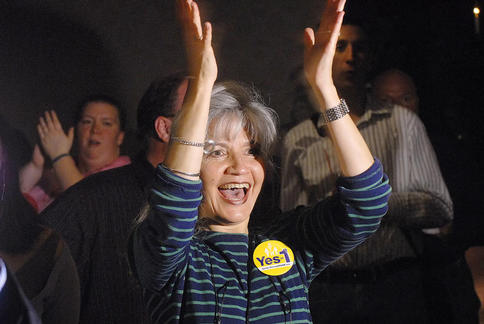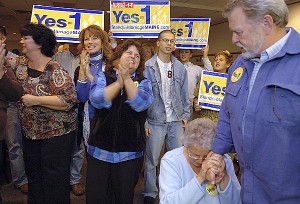
Like countless supporters of marriage equality across the country, I am disturbed and saddened by Maine voters' approval of a referendum overturning the state's same-sex marriage law. It is particularly difficult to watch people (like those in the photos below) celebrating the denial of basic civil rights to their fellow citizens.


If the referendum had gone the other way, those who oppose same-sex marriages would have woken up today with all of their rights and benefits intact. Not a single heterosexual marriage would have been negatively impacted if voters had permitted the same-sex marriage law to stand. On the other hand, same-sex couples across Maine woke up today with the cold realization that they remain second-class citizens under the laws of their own state.
As difficult as losses such as the one in Maine is for supporters of the legal recognition of same-sex relationships, it is important to keep in mind just how far we have come on this issue in a very short period of time. As recently as 15 years ago, there was not a single state law that provided any form of recognition or protection to same-sex couples. This meant that as far as the laws of all 50 states were concerned, the relationships of same-sex couples -- no matter how committed or long-lasting -- had no greater legal significance than those of roommates or friends. In stark contrast, there are today five states that recognize same-sex marriages. And an additional half a dozen states provide same-sex couples with all of the rights and benefits afforded to married straight couples through civil unions or domestic partnership laws. (In fact, while Maine voters were repealing their state's same-sex marriage law, Washington state voters were approving a comprehensive domestic partnership statute enacted by the legislature that offers same-sex couples the same rights and benefits under state law provided to married heterosexuals.)
It is also important to keep in mind that opponents of equality prevailed in Maine -- as they did in California a year ago -- by a slim margin. Polls consistently show that there is a growing generational gap on the issue of same-sex marriage, with a significant majority of younger Americans believing that same-sex couples should be permitted to marry. This means that time is on the side of marriage equality. The fact that equality opponents in places like California and Maine have been able to prevail at the ballot box by only a handful of percentage points strongly suggests that they will be unable to maintain their victories as new generations of voters demand to be heard on this issue.
None of this, of course, takes the sting out of painful losses for the marriage equality movement like the one in Maine. But focusing on the long run can help us keep these losses in perspective because it reminds us that they are skirmishes in a long struggle for the hearts and minds of Americans on the political, legal, and moral issues involving same-sex marriage.
Opponents of gay marriage are increasingly having a difficult time articulating why it is, exactly, that the legal recognition of such marriages would harm society. In fact, one of the lawyers defending California's ban on same-sex marriage in a federal lawsuit conceded in court recently that he did not know what the harm would be in allowing same-sex couples to marry. This leaves gay rights opponents relying largely on the argument that the question of which groups should have access to the institution of marriage should be decided by the people and not by judges or even by elected legislators. There will come a day in the not so distant future, however, when voters on this issue will begin to choose equality and fairness over exclusion and discrimination.